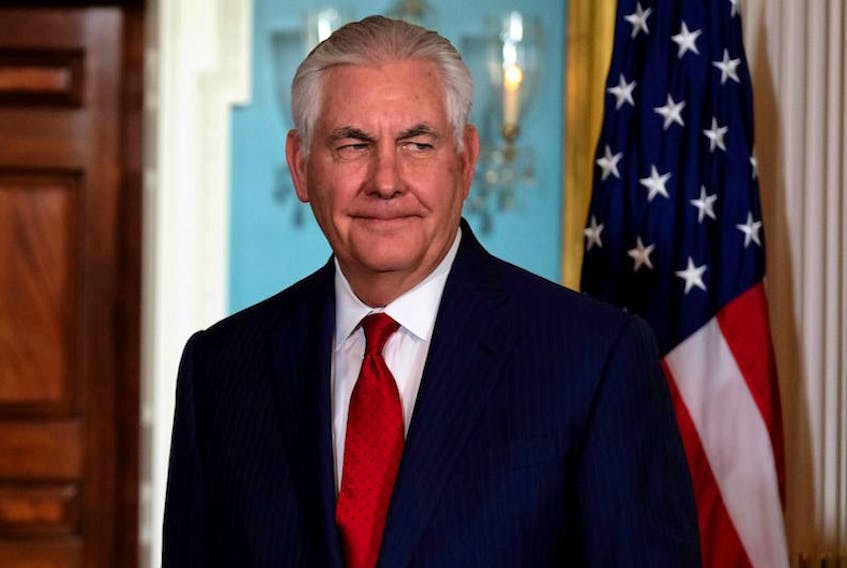BY PETER MCKENNA
GUEST OPINION
For some observers, perhaps even some within the Canadian government, the escalating U.S.-North Korea crisis is heading in the decidedly wrong diplomatic direction. They surmise that the two countries are getting dangerously close to the nuclear tipping point. Well, maybe.
In an effort to defuse this worrisome situation, Canada has offered the services of its ³good offices.² No one is really certain, though, whether that diplomatic overture will be welcomed by the two parties in question.
Still, U.S. Secretary of State Rex Tillerson will meet Prime Minister Trudeau today in Ottawa to discuss the ongoing crisis and Canada will co-host a meeting of interested foreign ministers early in the new year. For its part, the Trudeau government has sought to keep the two sides talking to one another, even if the North Koreans won¹t be present at the forthcoming Vancouver meeting.
A key component of that approach is Canada¹s cordial engagement with Cuba, a country that does have full diplomatic relations with Pyongyang. As Canada¹s Global Affairs Minister Chrystia Freeland explains: ³Cuba is a country that Canada has good relations with and so we have conversations.²
Although she acknowledged that the Cuban government would not be acting as a messenger for Ottawa, Minister Freeland would not go into further details. ³That is all I am going to say about our conversations.²
Advocates of Canada¹s efforts have been quick to highlight Ottawa¹s long-standing and storied diplomatic relationship with Havana. It is true that Canada was one of only two countries in the Americas (the other being Mexico) not to sever official contacts with Cuba in the early 1960s. And the Cubans have always appreciated the Canadian government¹s decision, irrespective of political party stripe, to vote consistently in the UN against the U.S. economic blockade of Cuba. Lastly, and not insignificantly, the Trudeaus have had a very close personal relationship with the Castros over the decades.
Ever since the disastrous U.S.-sponsored Bay of Pigs invasion in 1961, Canada has offered to mediate the dysfunctional U.S.-Cuba relationship. Though it was not always clear that Ottawa¹s interventions were appreciated, both countries played along knowing full well that nothing substantive would come of them.
Both Washington and Havana had their own reasonsmostly of a domestic naturefor why they preferred a non-existent diplomatic relationship. That may well be the case today with respect to the motivations of Washington and Pyongyang.
Nonetheless, some will point to Canada¹s role in helping to normalize relations between Castro¹s Cuba and the United States in the summer of 2014. But as officials close to those discussions have intimatedand much still remains unknown about Canada¹s precise role in the bilateral talksOttawa played a strictly facilitative function and not one that involved direct mediation.
So I think that the Canadian government should be very careful here and not get its hopes up. Yes, the Cubans will listen politely and intently because it is coming from Justin Trudeau. But they will most assuredly not take their marching orders from Ottawa. Indeed, the Cubans are known internationally to march to the beat of their own drumand no one else¹s.
I¹m not even sure that the Cuban government would be interested in playing a mediation role between the United States and the North Koreans. They certainly don¹t feel any loyalty to U.S. President Donald Trump, who has sought to rollback various elements of Barack Obama¹s December 2014 entente with the Cubans.
Far be it for the Cuban government to try to get Trump out of the diplomatic corner that he has thoughtlessly painted himself into. It is even possible that Havana views Trump¹s entanglement with North Korea as shifting his focus away other places like Cuba and Venezuela (a Cuban friend in the region). And in the absence of a direct plea from North Korea¹s Kim Jong-un, I¹m not convinced that the Cubans would want to assert whatever diplomatic leverage they may have in this particular case.
Moreover, Cuban President Raúl Castro is not going to sacrifice its coveted bilateral relationship with China by sticking its nose somewhere where Beijing would prefer it did not. The Cubans are far too pragmatic to let that happen.
Having said that, there¹s nothing inherently wrong with hosting an international meeting or talking to the Cubans on the side. But let¹s not expect anything earth-shattering to come from them given that the odds are largely stacked against it.
Peter McKenna is professor and chair of political science at the University of Prince Edward Island.









